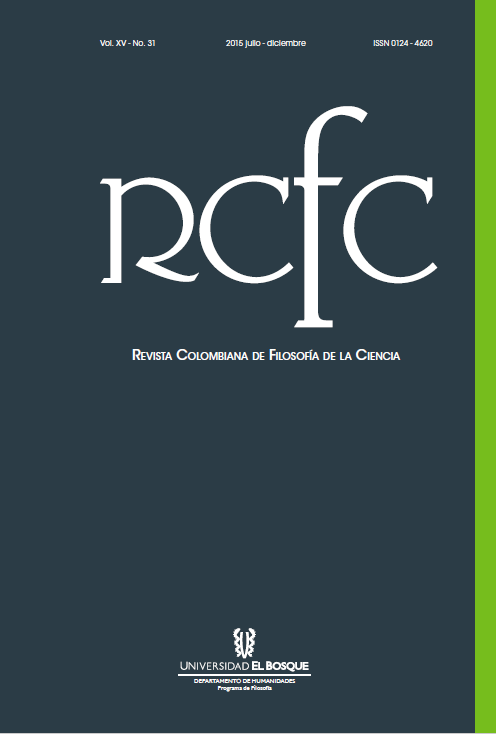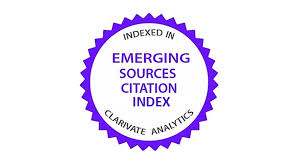Las matemáticas de los siglos XVI y XVII en la historiografía científica contemporánea
DOI:
https://doi.org/10.18270/rcfc.v15i31.1281Abstract
Este artículo aborda el modo como se ha estudiado el papel de las matemáticas en la Revolución Científica de los siglos XVI y XVII en la historiografía científica contemporánea, resaltando, de un lado, los límites y alcances que la historiografía tradicional ofrece a propósito de la hegemonía de las matemáticas sobre la filosofía natural y, de otro, las perspectivas revisionistas que apelan a estudios más concretos, los cuales ofrecen una comprensión más conceptual y contextual respecto de la introducción de las matemáticas en la filosofía natural. En primer lugar, expondré en términos generales el modo como la historiografía científica contemporánea ha abordado el tema de las matemáticas en la Revolución Científica de los siglos XVI y XVII. En segundo lugar, presentaré los límites y alcances de la narrativa tradicional con el fin de señalar la relevancia y la necesidad de incluir en los estudios sobre las matemáticas y la filosofía natural en los siglos XVI y XVII, una postura que indague, también, los obstáculos, errores y transformaciones propias de una disciplina como las matemáticas que ha sido concebida como disciplina fundamental en los orígenes de la ciencia moderna.
Downloads
References
Bertoloni-Meli, Domenico. Thinking with objects: the transformation of mechanics in the seventeenth century. Baltimore: The Johns Hopkins University Press, 2006.
Biagioli, Mario. “The Social Status of Italian Mathematicians, 1450-1600”. History of Science, vol. 27, (1989).
Butterfield, Herbert. Los orígenes de la ciencia moderna. España: Taurus, 1958.
Carolino, Luis. “Cristoforo Borri and the epistemological status of mathematics in seventeenth-century Portugal”. Historia Mathematica, 34, (2007): 187-205.
Clavius, Christoph. Opera mathematica. Mainz: Reinhard Eltz, 1612.
Cohen, Bernard. “The eighteenth century origins of the concept of scientific revolution”. Journal of the History of Ideas, 37(2). (1976): 257-288.
_____. La revolución newtoniana y la transformación de las ideas científicas. (C. Solís Santos, Trans.). Madrid: Alianza, 1980/1983.
_____. Revolución en la ciencia. De la naturaleza de las revoluciones científicas, de sus etapas y desarrollo temporal, de los factores creativos que generaron las ideas y de los criterios específicos que permiten determinarlas. (D. Zadunaisky, Trans.). Barcelona: Gedisa, 1985/1989.
Cozzoli, Daniele. “Alessandro Piccolomini and the Certitude of Mathematics”. History and Philosophy of Logic. 28, (2007): 151-171.
De Gant, François. Husserl et Galilée. Sur la crise des les sciences européennes. Paris: Vrin, 2004.
Dear, Peter. Discipline and experience. The mathematical way in the scientific revolution. Chicago: University of Chicago Press, 1995.
_____. Revolutionizing the sciences.European knowledge and its ambitions, 1500-1700. Houndmills: Palgrave, 2001.
_____. “Jesuit mathematical science and the reconstitution of experience in the early seventeenth century”. Studies in History and Philosophy of Science, 18(2), (1987): 133-175.
Dijksterhuis, Fokko Jan. “Practices of mathematization”. Society for Philosophy of Science in Practice, Netherlands, University of Twente. (2007).
Feldhay, Rivka. “The use and abuse of mathematical entities: Galileo and the Jesuits revisited”. The Cambridge companion to Galileo, Cambridge: Cambridge University Press, (1998): 80-145.
Finocchiaro, Maurice. Defending Copernicus and Galileo. Critical reasoning in the two affairs. Dordrecht: Springer, 2010.
Giacobbe, Giulio. “Alcune cinquecentine riguardanti il processo di rivalutazione epistemologica della matematica nell'ambito della rivoluzione scientifica rinascimentale”. La Berio, Bollettino Bibliografico Quadrimestrale, XIII, 2-3. (1973): 7-44.
_____. “Epigoni nel Seicento della quaestio de certitudine mathematicarum: Giuseppe Biancani.” Physis, Rivista Internazionale di Storia della Scienza, XVIII, 1. (1976): 5-40.
_____. “Francesco Barozzi e la quaestio de certitudine mathematicarum.” Physis, Rivista Internazionale di Storia della Scienza, XIV, 4. (1972b): 357-374.
_____. “Il Commentarium de certitudine mathematicarum disciplinarum di Alessandro Piccolomini.” Physis, Rivista Internazionale di Storia della Scienza XIV.2 (1972a): 162-93.
_____. “La quaestio de certitudine mathematicarum all'interno della Scuola Padovana”. Atti del Convegno Internazionale di Storia della Logica, (1972c): 203-212.
_____. “Un gesuita progressista nella quaestio de certitudine mathematicarum rinascimentale: Benito Pereyra.” Physis, Rivista Internazionale di Storia della Scienza, XIX, 2. (1977): 51-86.
Gingras, Yves. “What did Mathematics do to Physics?” History of Science, 39, (2001): 383-416.
Hall, Alfred Rupert. La revolución científica 1500-1750. (J. Beltrán, Trans.). Barcelona: Crítica, 1954.
Henry, John. The Scientific Revolution and the Origins of Modern Science (2nd ed.). New York: Palgrave, 2002.
Husserl, Edmund. La crisis de las ciencias europeas y la fenomenología trascendental. Trad. Julia V. Iribarne. Buenos Aires: Prometeo libros, 2008.
Jardine, Nicholas. “Epistemology of the sciences.” Cambridge History of Renaissance Philosophy. Cambridge: Cambridge University Press. (1998/2008): 685-711.
Koyré, Alexandre. Estudios de historia del pensamiento científico. México: Siglo XXI editors, 2007.
Kristeller, Paul Oskar, “The Scholar and his Public in the Late Middle Ages and the Renaissance”. Medieval Aspects of Renaissance Learning. Three Essays by P. O. Kristeller, (E. P. Mahoney trans.), Duke University Press, 1974.
Lohr, Charles. “The medieval interpretation of Aristotle”. The Cambridge History of Later Medieval Philosophy. From the rediscovery of Aristotle to the disintegration of Scholasticism 1100-1600, cap. 3. Cambridge: Cambridge University Press. (1982): 80-98.
_____. “The sixteenth-century transformation of the aristotelian division of the speculative sciences”. The Shapes of Knowledge from the Renaissance to the Enlightenment, cap. 4. Dordrecht: Kluwer Academic Publishers. (1991): 49-58.
Machamer, Peter. Galileo’s machines, his mathematics and his experiments. The Cambridge companion to Galileo. Cambridge: Cambridge University Press, (1998): 53-79.
Mancosu, Paolo. “Aristotelian logic and euclidean mathematics: seventeenth-century developments of the Quaestio de certitudine mathematicarum”. Studies in History and Philosophy of Science, 23, 2. (1992): 241-265.
_____. Philosophy of mathematics and mathematical practice in the seventeenth century. Oxford: Oxford University Press, 1992.
Ochoa, Felipe. “De la subordinación a la hegemonía. Sobre la legitimación epistemológica de las matemáticas en la filosofía natural en el siglo XVII”. Revista Civilizar Ciencias Sociales y Humanas. 13(25), (2013): 125-176.
Remmert, Volker R. “Galileo, God and Mathematics”. Mathematics and the divine: A historical study. Amsterdam: Elsevier B.V, (2005): 347-360.
Romano, Antonella. “El estatuto de las matemáticas hacia 1600”. Los orígenes de la Ciencia Moderna. Actas Alis XI y XII, Seminario “OROTAVA” Historia de la ciencia, (2004): 277-308.
Roux, Sophie. “Forms of mathematization”. (14th-17th Centuries). Early Science and Medicine, 15(4-5), (2010): 319-337.
Schöttler, Tobias. “From causes to relations: The Emergence of a non-aristotelian concept of geometrical proof out of the Quaestio certitudine mathematicarum”. Society and Politics, vol.6, N°2, (2012): 29-47.
Shapin, Steven. La Revolución Científica. Una interpretación alternativa, Barcelona: Paidós, 2000.
Van Dyck, Maarten. An archaeology of Galileo’s science of motion. Dissertation (Tesis de doctorado). Ghent University. Faculty of Arts and Philosophy, Ghent, Belgium, (2006).
Velilla, Helbert. “El debate sobre la certeza de las matemáticas en la filosofía natural de los siglos XVI y XVII (De quaestio de certitudine mathematicarum)”. Saga, 28, (2015).
_____. “La ascensión de las matemáticas en la Modernidad: epistemología y teología voluntarista en Isaac Barrow”. Légein, 17, (2013): 161-176.
Downloads
Published
How to Cite
Issue
Section

| Article metrics | |
|---|---|
| Abstract views | |
| Galley vies | |
| PDF Views | |
| HTML views | |
| Other views | |











